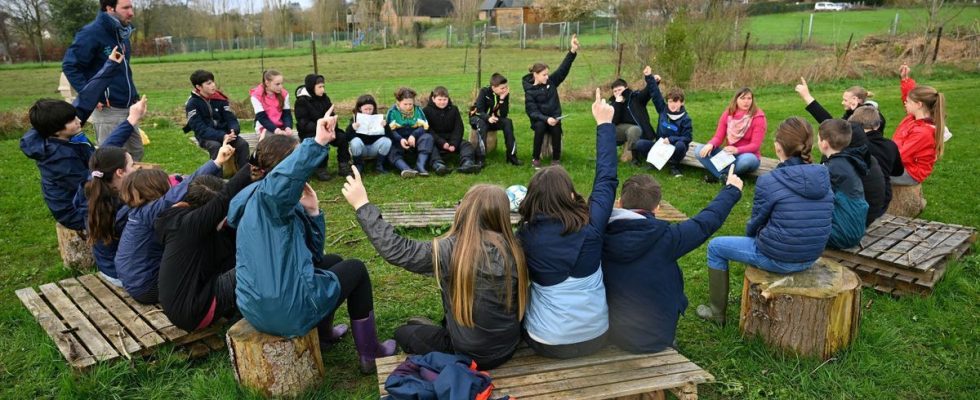Published on
Updated
Reading 2 min.
Squatting on the grass at the edge of a wood, children form the outlines of a rectangle, a pentagon and a hexagon with the twigs they have just collected from under the trees.
That morning, for 25 schoolchildren from the village of Vezin, in Andenne in central Belgium, the geometry lesson took place in a vast green space made available to them 10 minutes on foot from their establishment.
It’s time for the “School from outside”, a practice that the French-speaking region of Wallonia has been developing since the Covid crisis, relying on a network of associations which train and support teachers in this new type learning.
Supervised by its teacher, this unique 5th and 6th grade class – children aged 11-12 – is welcomed to the meadow by a facilitator-educator sent by one of the partner associations.
The latter makes the students sit in a circle to listen to them introduce themselves, take “the weather of emotions“.
Before releasing them, he reminds some basic rules of outdoor activity, such as “respecting living things” and in particular not uprooting plants.
The sequence will last approximately an hour and a half, until the students, divided into groups of four, have had their geometric constructions, fraction calculations or other mathematical problems specially adapted to this unusual setting approved by their teacher.
“We are more free”
To be outside “allows us to work with materials differently“, underlines the teacher, Julie Hubeaux.
“And the children are demanding, the health crisis has pushed them to be a lot in front of their screen and not enough outside“, she continues, also noting the difficulties of concentration in class where “they have to sit for hours“.
Around the teacher, the children nod, with broad smiles. “We get some fresh air, we let off steam“, Timéo blurted out. “It’s more fun to be outside, we’re freer“, adds Anaïs.
On the authorities’ side, we confirm that the Covid crisis and its succession of health restrictions between 2020 and 2022 were a sort of catalyst for these so-called “outside” pedagogies, tested for two years by around 500 Walloon schools, mainly nursery and primaries.
“At the end of the confinements, we noticed that there was a lack of people trained in this teaching method, despite the very strong demand from schools. It is on this specific link that we worked“, explains Walloon Minister of the Environment, Céline Tellier, to AFP.
Sandrine Damsin, director of the Vezin municipal school, is one of the enthusiasts.
She welcomed with open arms into her establishment the Namur association Empreintes and its speech on the importance of connection with nature “for well-being and appeasement”, an element which is one of the markers of so-called alternative pedagogies. (Steiner-Waldorf, Montessori).
“In nature, children use all their senses… Touch, see, hear, smell. They are really more attentive, experience the learning themselves and will therefore memorize it better“, underlines the director.
